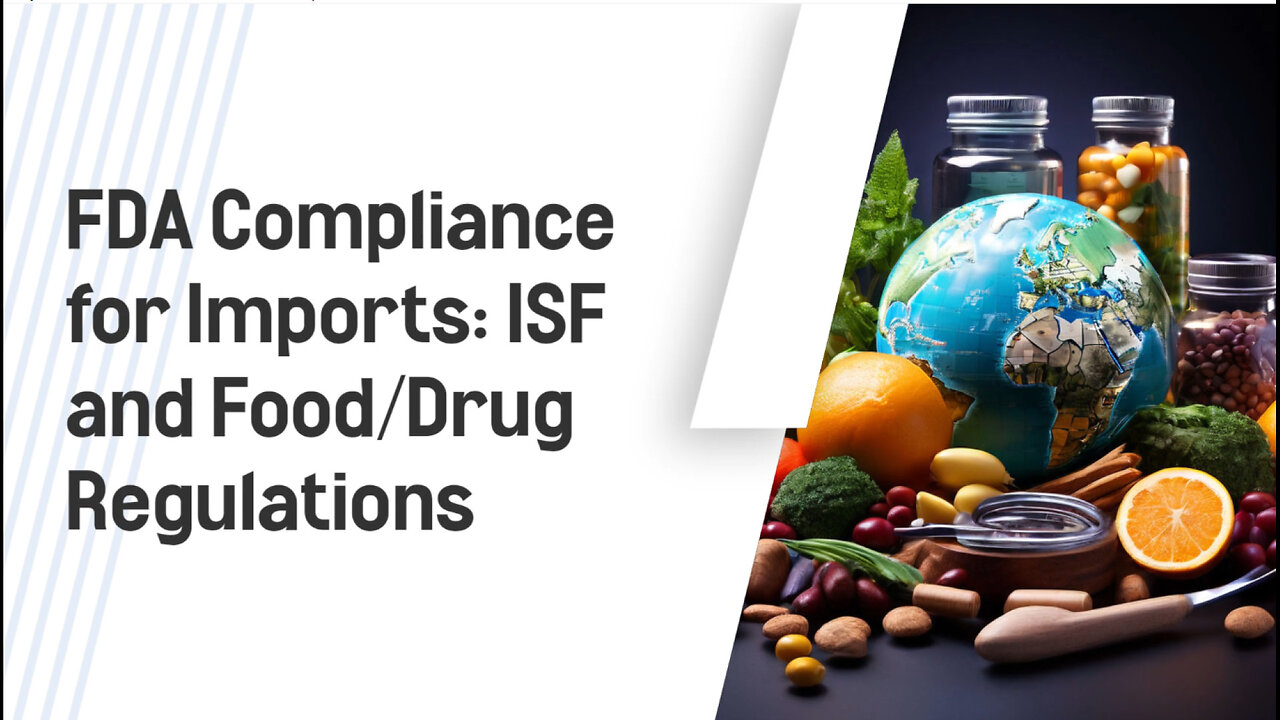Premium Only Content

Demystifying FDA Compliance: Key Steps for Importing Food and Drug Products
ISF Depot // 661-246-8217 // customs@isfdepot.com // www.isfdepot.com
In today's video, we delved into the topic of ISF Compliance with FDA Food and Drug Administration requirements. It is crucial for customs brokers and importers involved in the importation of food and drug products to understand and comply with these specific regulations and obligations set forth by the FDA. Failure to do so could result in delays, penalties, or even seizure of goods.
The first step in ensuring compliance with FDA requirements is to determine if your goods fall under FDA jurisdiction. The FDA regulates various products, including food, drugs, medical devices, cosmetics, and dietary supplements. If your imports fall within these categories, it is necessary to comply with FDA regulations.
One of the key requirements for FDA compliance is the submission of an Importer Security Filing (ISF), also known as the 10+2 filing. This filing requires providing certain information about the imported goods to US Customs and Border Protection (CBP) at least 24 hours before they are loaded onto a vessel.
When it comes to FDA-regulated products, the ISF filing must include additional information related to the FDA. This includes the FDA product code, the FDA manufacturer facility registration number, and the FDA commodity code. Ensuring accuracy and timeliness in the submission of this information is crucial to avoid delays and penalties.
Apart from the ISF filing, the FDA also requires various other documentation for FDA-regulated products, such as prior notice of imported food shipments, facility registration, fumigation certificates, and laboratory analysis reports.
It is important to note that the FDA has the authority to examine and sample imported goods to ensure compliance. Non-compliance with FDA requirements can lead to product detention, refusal, or destruction. Therefore, it is essential to work with a knowledgeable customs broker who understands the FDA requirements to ensure a smooth and compliant importation process.
In conclusion, understanding and adhering to FDA regulations is crucial for the smooth importation of food and drug products. Working with an experienced customs broker who can navigate the complexities of FDA regulations will greatly benefit importers in meeting all necessary requirements for the seamless entry of goods into the US. Stay tuned for our upcoming videos where we will cover more topics related to customs brokerage and international trade.
#usimportbond #isfcustomsbroker #uscustomsclearing #isfentry
Video Disclaimer Here: This tutorial is independent and not affiliated with any US governmental entities.
-
 2:48
2:48
Steven Crowder
1 day agoCROWDER CLASSICS: What’s This? | Nightmare Before Kwanzaa (Nightmare Before Christmas Parody)
340K13 -
 33:49
33:49
Quite Frankly
1 day agoThe Christmas Eve Midnight Telethon
134K23 -
 2:12:46
2:12:46
Price of Reason
1 day agoAmber Heard BACKS Blake Lively Lawsuit Against Justin Baldoni! Is Disney CEO Bob Iger in TROUBLE?
81.4K24 -
 1:01:17
1:01:17
The StoneZONE with Roger Stone
1 day agoChristmas Edition: Why the Panama Canal is Part of the America First Agenda | The StoneZONE
150K52 -
 18:12:15
18:12:15
LFA TV
1 day agoLFA TV CHRISTMAS EVE REPLAY
159K19 -
 13:32
13:32
Scammer Payback
1 day agoChanging the Scammer's Desktop Background to his Location
25.5K6 -
 4:21
4:21
BIG NEM
1 day agoNikola Tesla's Secret to Cultivating Creativity & Genius
19.8K1 -
 15:03
15:03
The Anthony Rogers Show
2 days agoAnthony Rogers - Live at Cusumano's Pizza (Upstairs)
15.7K1 -
 4:33:48
4:33:48
tacetmort3m
1 day ago🔴 LIVE - THE ZONE KEEPS PULLING ME BACK - STALKER 2 - PART 15
78.2K13 -
 22:45
22:45
Brewzle
1 day agoI Went Drinking In A Real Bourbon Castle
55.4K4